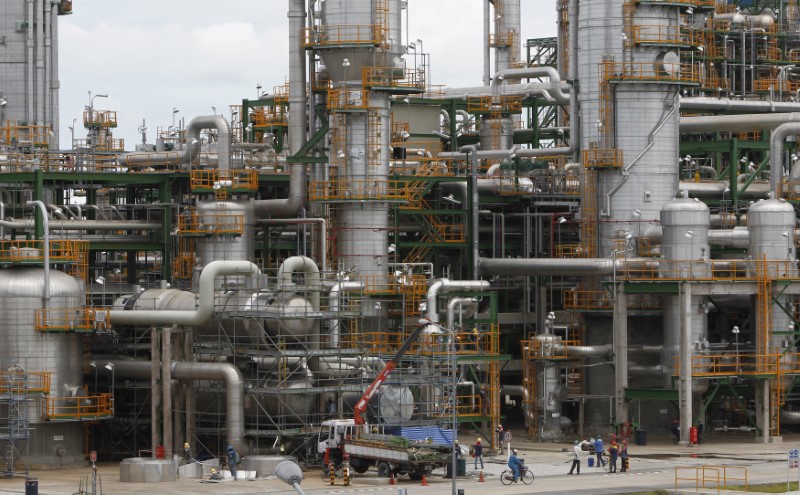By Chayut Setboonsarng
BANGKOK, August 14 (Reuters) - Thai companies have accumulated a record $34 billion in cash, prompting some investors to demand companies from oil producers to food suppliers consider deals to put the money to work - or hand it back to shareholders.
Some of Thailand's biggest corporate names, including energy giant PTT Group Pcl (BK:PTT), the largest convenience store operator CP ALL Pcl (BK:CPALL) and agribusiness CP Foods Pcl (BK:CPF), are hoarding cash.
With few investment opportunities at home, Thai companies are looking abroad, but a patchy track record of foreign acquisitions and growing competition in Southeast Asia has left managements risk averse.
"Idle cash piles are dragging on investors' returns and should be put to work," said Patcharapa Mahatthanakul, fund manager at UOB Asset Management in Thailand. She said investment in increasing production capacity or for acquisitions "is preferable."
Companies listed on Thailand's main stock index (SETI) produced an average dividend yield of 3.1 percent and a return on assets of between 2 percent and 7 percent so far in 2017, ratios that are slightly above regional peers.
But with such large cash piles, investors are growing impatient for companies to do more.
"Thai companies have done well, but if they do not have aggressive plans, they should return more profits to investors," Jalil Rasheed, chief executive of Invesco Southeast Asia, told Reuters.
Thailand's economic growth of 3.6 percent is a laggard in Southeast Asia. Domestic investment is slowing down due to excess factory capacity and weak demand, while outbound M&A investment by Thai companies is falling sharply.
Thomson Reuters data shows outbound M&A investment dropped 37 percent to just $1.2 billion in the first half of 2017, compared with the same period in 2016, the first decline in three years.
A military junta took control of the government following months of street protests in 2014. However, postponement of elections is testing confidence.
"Thai companies have healthy balance sheets, but are very prudent and careful when going overseas," Kesara Manchusree, president of the Stock Exchange of Thailand, told Reuters.
The energy and power companies account for most of the cash with some $20 billion in their coffers. They have been searching for M&A targets abroad, but the only major expenditure has been a $500 million investment in a liquefied natural gas project in Malaysia by a PTT venture.
A dispute with the Indonesian government over an alleged oil spill has prompted PTTEP, the upstream arm of PTT, to put on hold further investment in Indonesia.
PTT and PTTEP have combined cash pile of $15 billion.
"If there are no good opportunities, then cash should be returned to shareholders. Holding on to too much cash is risky," Piyasvasti Amranand, chairman of PTT Group, told Reuters.
CP ALL and CP Foods controlled by Thailand's richest man, Dhanin Chearavanont, together had $1.7 billion in cash as of March's income statement.
CP Group, the parent company, spent nearly $90 million on acquisitions in Britain and Germany this year, but dropped out of a potential 1.5 billion euro deal ($1.7 billion) to buy Polish retailer Zabka.
Efforts by its Indonesian arm to takeover the local 7-Eleven franchise collapsed in June.
In response to a question about whether they would hand cash back to shareholders, a spokesman for CP ALL said the issue was a management matter and a spokesman for CP Foods said the company pays out about 50 percent of its earnings to shareholders.
"The global landscape is not conducive for M&As," said Thirapong Chansiri, chief executive of Thai Union Group (BK:TU), which last year spent over $600 million to buy American restaurant chain Red Lobster and German-based Rugen Fisch.
Myanmar and Vietnam offer investment opportunities, Thai businessmen said, but other foreign bidders are keen as well.
"Competition is intensifying in Southeast Asia with non-Thai multinationals and funds hunting for investment opportunities in these emerging markets," Jalil said.
Still, there have not been any major share repurchase programmes by Thai companies this year and historically they have not been keen on them either.
"Traditionally, Thai firms only buy back shares to help stock prices, but not as part of a broader strategy," said Paiboon Nalinthrangkurn of TISCO Securities. "These large cash piles means companies need to rethink capital allocation."

For a graphic, click http://tmsnrt.rs/2eGOb2L